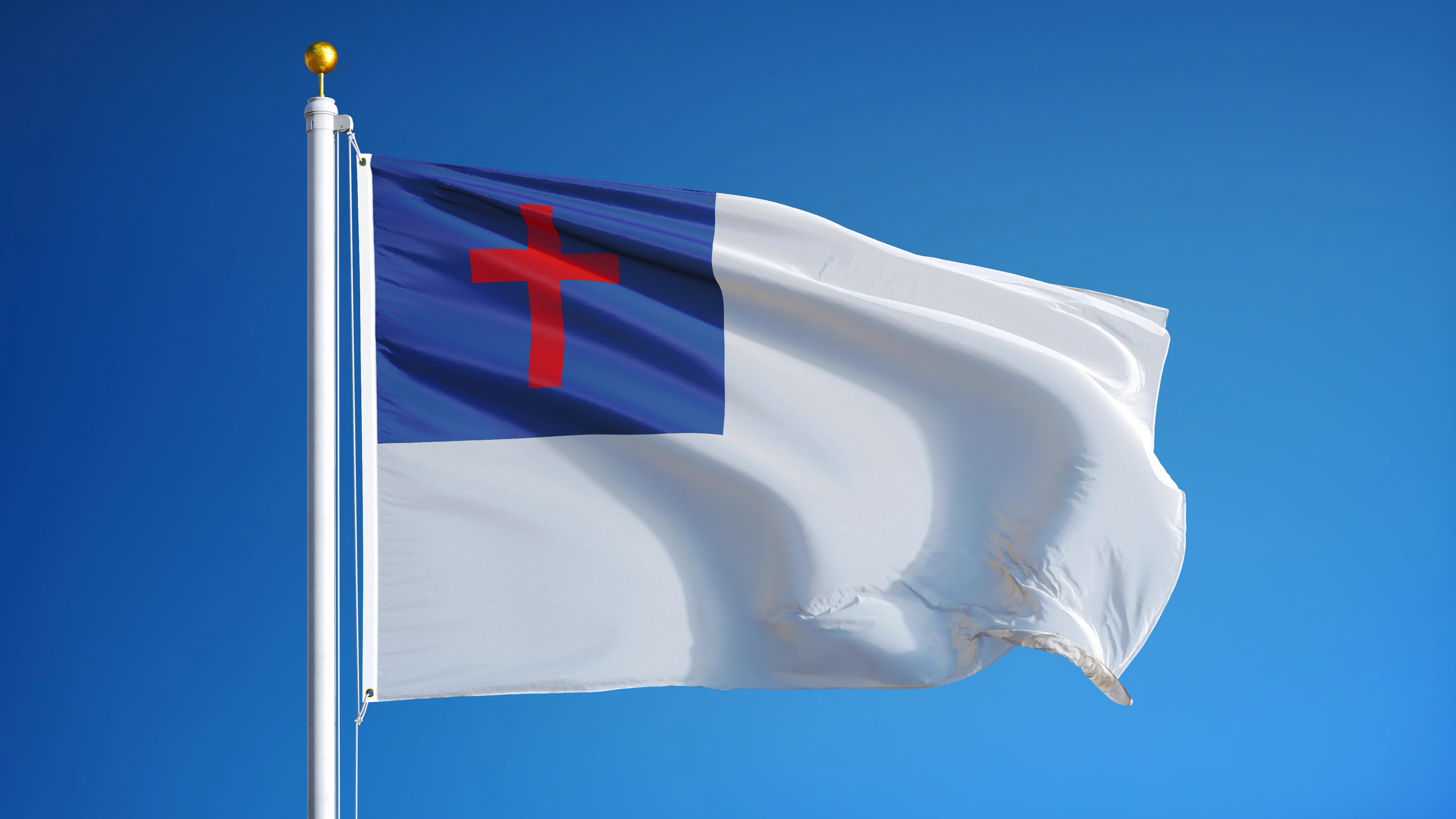
The Freedom From Religion Foundation and a like-minded group are contending to the U.S. Supreme Court that the city of Boston has properly refused to fly a Christian flag at City Hall.
The high court announced in September that it will hear Shurtleff v. City of Boston, in which the petitioners, an organization called Camp Constitution, had demanded that the city display the Christian flag featuring a blue rectangle in the corner with a blood-red Latin cross. This is the same flag that was paraded during the Jan. 6 Capitol insurrection, intermingled with symbols of white supremacy, by Christian nationalists, FFRF has pointed out.
The state/church watchdog and the Center For Inquiry agree in their joint amicus brief about the correctness of the 1st Circuit Court of Appeals’ decision early this year. The panel unanimously ruled that flags displayed on a government flagpole constitute government speech and therefore displaying the Christian flag or any religious flag on a city hall flagpole could constitute impermissible endorsement of religion.
Boston’s City Hall has three 83-foot-tall flagpoles standing prominently in front of the entrance: one that flies the U.S. flag, one that flies the Massachusetts flag and a third flagpole flying the city flag. Occasionally, the city approves replacing the city flag with another flag, usually representing another country or an officially recognized event, for limited periods of time. Over 90 percent of such flag raisings were of national flags, and city employees are present for each flag-raising.
“The city of Boston’s government flagpole should properly be considered a nonpublic forum, if it is a forum at all,” asserts FFRF’s brief. “The discretion of government officials and bodies to limit speech in a nonpublic forum is significantly greater than the latitude for a traditional public forum or a designated public forum.”
Boston’s concern not to give the appearance of endorsement in violation of the Establishment Clause is a reasonable justification for not approving the display of religious flags on a government flagpole, the brief adds, and the appearance of endorsement is a legitimate basis upon which to act. Government flagpoles are so intimately and inherently identified with the government as speaker/sponsor that the appearance of religious endorsement cannot be obviated.
“In effect, the petitioners seek merely for this court to engage in alleged error correcting, but even as to that limited issue, the 1st Circuit’s decision should not be reversed,” the brief states. “Boston’s refusal to approve the Christian flag for display on a government flagpole was reasonable in context. Inclusion of religious displays in a nonpublic forum is not mandated by the Constitution.”
The brief makes a number of arguments.
It maintains that Boston’s flagpole is a nonpublic forum subject to reasonable restrictions, even if the petitioners unpersuasively argue that the flagpole at issue is a designated public forum.
And it avers that Boston’s restriction on religious flags is reasonable. The city’s appropriate concern to avoid the appearance of religious endorsement in violation of the Establishment Clause is a reasonable basis for Boston’s policy and practice. “Nor do the petitoners claim, for example, that Christian flags were prohibited but Jewish, Muslim or anti-religious flags would have been allowed, which would present an obvious case of viewpoint discrimination,” FFRF’s brief asserts.
The Supreme Court should therefore affirm the decision of the 1st Circuit Court, the brief concludes.
FFRF had previously joined a friend-of-the-court brief filed with the 1st Circuit supporting the city’s position. The state/church watchdog hosted its 44th annual convention in Boston last month.
Camp Constitution, a Christian group, asked the city to fly the Christian flag in observance of Constitution Day on Sept. 17, in response to the city flying the rainbow LGBTQ flag for the officially recognized Boston Pride Month. Camp Constitution is being represented by Liberty Counsel, an extremist Christian nationalist law firm.
FFRF warmly thanks Richard Bolton of Boardman & Clark law firm in Madison, Wis., for his pro bono work in drafting the amicus brief.
The Freedom From Religion Foundation is the largest association of freethinkers in the United States, representing more than 35,000 atheists, agnostics, and other nonreligious Americans, including more than 700 members in Massachusetts. Its two primary purposes are to educate the public about nontheism and to defend the constitutional principle of separation between state and church.
The Center For Inquiry is a nonprofit educational organization dedicated to promoting and defending science, reason, humanist values and freedom of inquiry.

